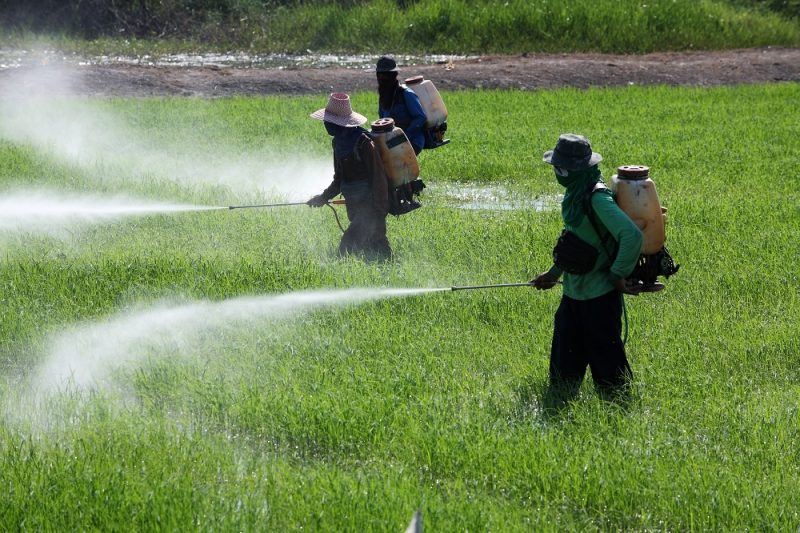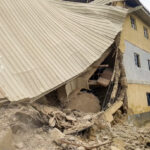Cheap, fast-acting pesticides banned in Europe and the US are flooding Nigerian markets, leaving farmers sick, consumers exposed and the country losing millions in rejected exports.
Praise Kenechukwu bends over her rice field, a knapsack sprayer strapped across her back. The chemical mist drifts around her, stinging her throat. Her skin also tingles with irritation.
Sometimes the rashes last for days. To ease the discomfort, she rinses quickly with water and massages the scalded flesh with balm. Indeed protective gear would help, but as she puts it in Nigerian pidgin, “we no get complete PPE. You fit, get boot but no glove, or glove but no mask. You just manage wetin you get.”
Pesticides are commonplace in farming, warding off weeds and disease-causing microorganisms, thereby boosting harvests. Alongside these benefits are hazards for frequent users like Kenechukwu, causing her to switch between brands, wear long clothing to cover her skin and turn to traditional ointments for antidotes.
Her experience mirrors a broader truth in which farmers are increasingly absorbing lethal chemicals every day, oblivious to the hazards.
Agronomist and research enthusiast Obodo Profit points to lax regulation regarding agrochemicals as a major culprit. “Some of these pesticides banned in Europe and the U.S. are still here because Nigeria never says, ‘we ban you.’ Once they can’t sell abroad, they dump them here.”
The Food and Agriculture Organisation (FAO) labels many pesticides still in use locally as “highly hazardous,” although they remain commercially available.
Products like paraquat and dichlorvos, popularly known as Ota piapia, which have been linked to cancers, Parkinson’s disease, and acute poisoning, are still commonly used by farmers in Nigeria each day. They are cheap and fast-acting.
Profit explains that agencies like regulatory agencies like NAFDAC are burdened with limited manpower and inadequate laboratories, resulting in weak supervision of pesticide residues.
The Maximum Residue Limit (MRL) checks, which ensure that exported and local produce meet safety standards, are rarely enforced. “Sometimes the researchers just go to the border, ask the exporter two or three questions, collect some data, and that’s it. That can only cover just a fragment,” she says.
A devastating human cost
The fallout of this limited scrutiny is devastating. Over 65% of pesticides imported into Nigeria are hazardous. Many are unregistered, with poor labelling and no expiry dates.
More often than not, these fake chemicals don’t work as promised, forcing farmers to overapply in desperation and piling on the risks.
Farmers typically report skin disorders, respiratory illnesses, and even long-term diseases like cancer. Kenechukwu describes the frequent itches and burns that develop on her skin following contact with a pesticide.
Yet farmers treat these agrochemicals with wanton disregard for safety. Many use them without proper gear, often storing them in containers. “Imagine a child seeing the chemical and thinking it’s yoghurt?” Profit adds.
The impacts go beyond the farm. Pesticide residues linger on beans, maize, sesame, and groundnuts long after they’re harvested, putting hapless consumers at risk.
Each year, Nigeria loses more than $360 million to rejected agricultural exports due to pesticide misuse. Shipments that fail Maximum Residue Limit (MRL) tests in Europe or Asia are either destroyed or returned.
Why these pesticides remain in circulation
Despite their far-reaching impacts, these harmful pesticides are still being sold across the country. Three reasons explain why.
The first is the profit motive. Farmers want maximum yield at the lowest possible cost, so they gravitate toward strong chemicals that act quickly. “Some of these banned pesticides actually work very fast. Farmers like that, so they overuse them,” explains Profit.
Even large commercial farms, including those tied to the government, rely heavily on these products, creating conflicts of interest.
Market power is another factor. With agrochemical sales controlled by private shops, enforcement threatens powerful business interests. “If regulation will affect income, you will not see strong action,” she adds.
Some private companies reportedly pay to remain in operation even when their products are harmful.
The third barrier is farmer knowledge. Many smallholders have little training on safe usage, dosage or disposal. Labels are ignored or misunderstood, leading to inappropriate application practices like spraying against the wind, mixing with bare hands, or discarding containers in rivers.
Nigeria has faced repeated tragedies from pesticide misuse. In 2008, 112 people were poisoned by contaminated food. A recent case involved 120 students, sickened by beans laced with lindane, a toxic pesticide chemical.
Still, countless other cases go unreported. Globally, developing countries use just 25% of pesticides but record 99% of deaths, a pattern Nigeria mirrors.
These risks do not deter farmers like Kenechukwu. “If the skin starts itching, you wear a long shirt next time. You just manage with what you have,” she says.
Disposal is equally unsafe. Empty containers are thrown into bushes or rivers, and pesticides are often stored inside homes, sometimes dangerously close to children.
Searching for safer alternatives
Despite these dangers, safer options exist. Integrated Pest Management (IPM) combines biological, cultural, and chemical practices to control pests more sustainably. Farmers can rotate crops, introduce natural predators, or apply biopesticides made from microorganisms or plants.
Profit reckons that safer pesticides like IPM contend with big barriers. “Farmers ask, ‘Will it work like chemicals? Will it give me profit? How much will I spend?’ If you can’t answer those questions, they will not switch.”
Access is also another factor. “If safer and cheaper alternatives are available, of course farmers will switch,” she insists. “But if only 1% have access, and the price is high, forget it.”
Agronomists insist that farmers need practical training on safe pesticide use, protective gear, and disposal methods.
Given that cost is an essential factor, safer pesticides should be subsidised for farmers.
Additionally, strengthening regulatory agencies with better labs and technical staff will improve pesticide safety for farmers like Kenechukwu.
Resigning to her fate, she says, “We cannot stop. This is our livelihood. We only hope tomorrow doesn’t get worse.”
Summary not available at this time.






